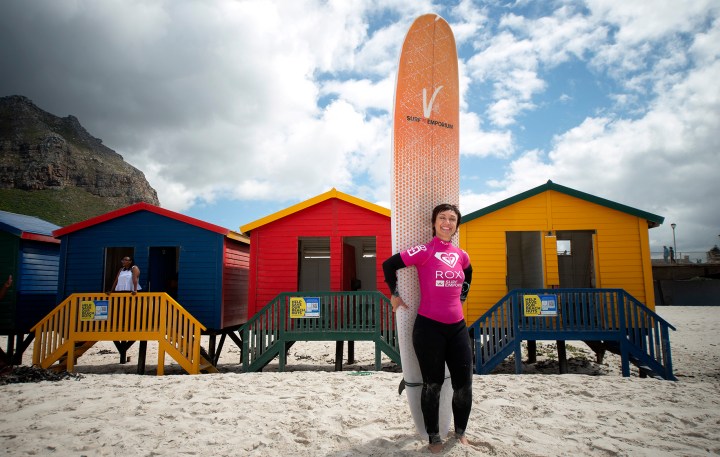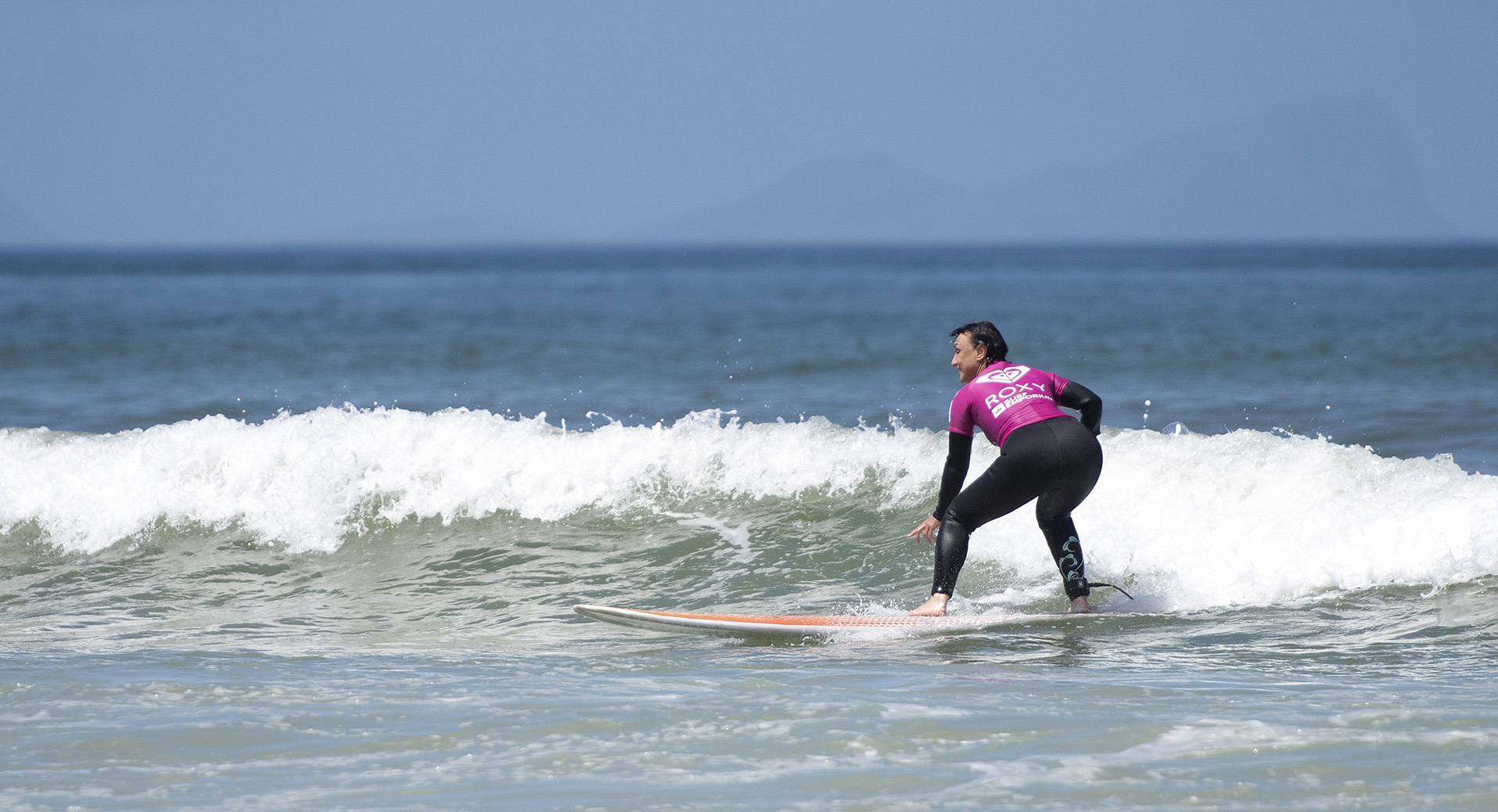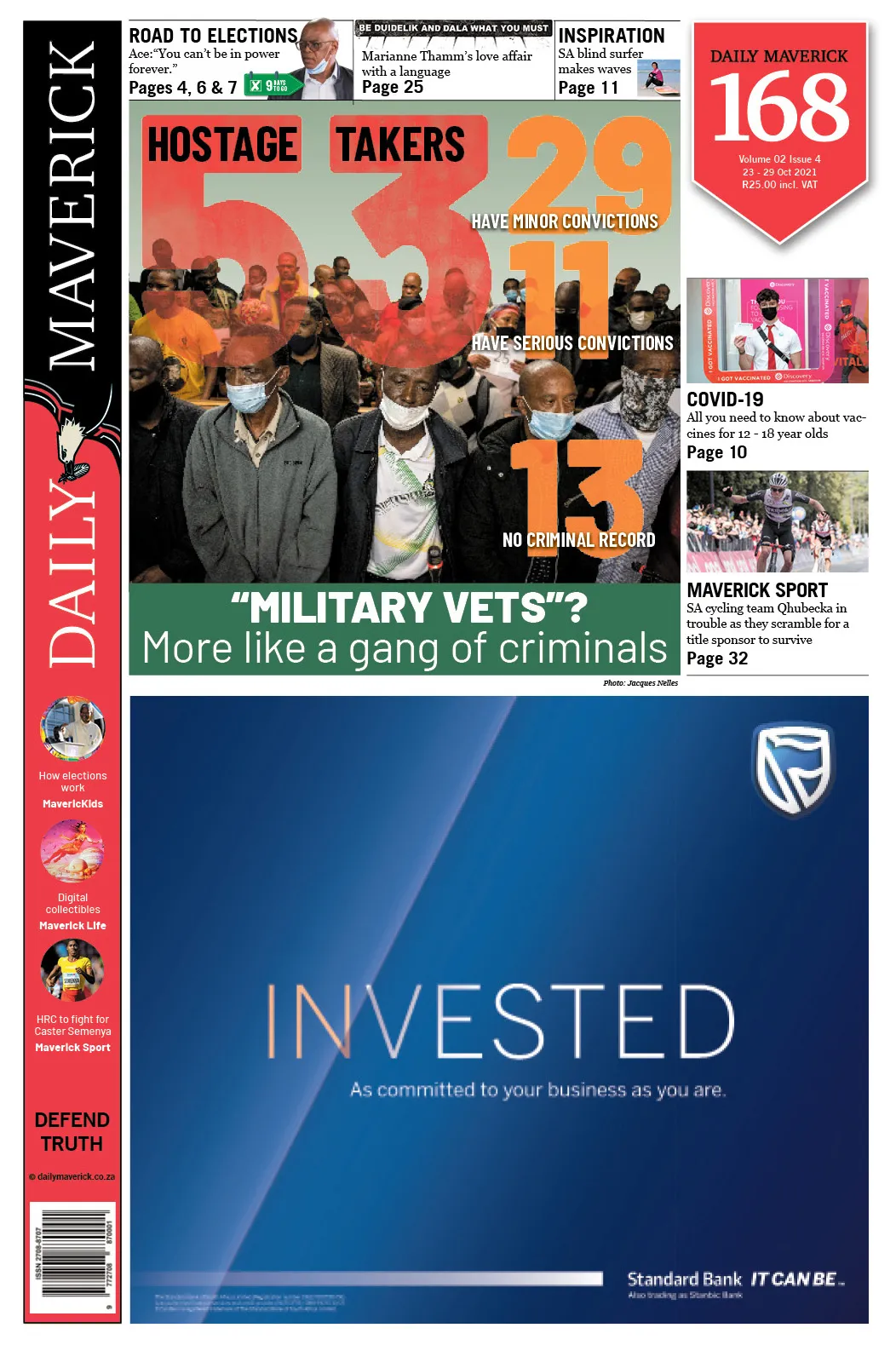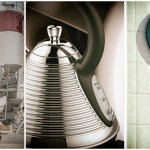VISUAL IMPAIRMENT
Instead of succumbing to fear and anger after losing her sight, surfer Michele Macfarlane is making waves

It’s a crisp morning at Surfer’s Corner in Muizenberg: a sun-streaked sky over hip-high waves, dotted with wetsuits. To our side, the area’s iconic brightly painted wooden huts are strung in a sea-facing row. Peripherally, I can see the huts. Facing me, Michele Macfarlane, a surfer from Cape Town, cannot.
In 2006, Michele Macfarlane was diagnosed with retinitis pigmentosa – a deteriorating genetically inherited eye disease that erodes peripheral or side vision, resulting in tunnel vision and sometimes blindness. Over coffee, Macfarlane says that, at present, only 7% of her vision remains. She explains, raising an index finger in front of her face: “Now I can see it.” She then shifts her finger a few centimetres to the side and says: “And now I can’t.”
Macfarlane’s eyes are the startling blue of a chlorinated swimming pool. Her magenta lips are curled into a smile.
The 53-year-old mother of four, writer and advocate for visually impaired people, is also a competitive surfer representing South Africa abroad.
In June at Durban’s New Pier, Macfarlane was one of 46 contestants at South Africa’s Para Surfing Championships, where she came tops in the “blind and visually impaired” women’s category. This cemented her spot in a team of 15 set to represent SA at the International Surf Association’s World Para Surfing Championships in California in December.
Also in the team is Macfarlane’s friend, Noluthando Makalima, who has cerebral palsy and struggles with fine motor skills and walking. Macfarlane relays how the two train together at Surfer’s Corner: “I’ll ask Noluthando: ‘Would you like to hold on to me?’ And she’ll be like: ‘Careful, there’s a stop coming up!’ And so, with me supporting her weight and her giving me directions, we make our way from the Surf Emporium to the beach.”
Other team members include current SA champion Daniel Nel, who was paralysed from the chest down after a motorbiking accident, and Tyler Pike, who has right-sided hemiplegia. He attended school with Macfarlane’s eldest daughter, Hanna.
“When he was younger, I used to help Tyler,” says Macfarlane. “Now, as I’m going blind, he’s helping me.”
Macfarlane first noticed eyesight issues in her early thirties: “We would go for walks at night, and I was like: ‘Wow, it’s so dark!’ And: ‘The kids are so brave, running around even though it’s so dark.’ And I remember my then-husband saying to me: ‘Michele, it’s actually not that dark.’ See, you start losing your night vision first.”
She recalls her devastation when a test in 2006 revealed that she had only 40 degrees of her central vision left.
“This meant I had to give up driving,” she says. “I cried a lot, which is rare for me. I thought of all the freedom I would lose. How would I get my kids to school? What if I became rubbish company and no one wanted to be my friend any more? How would I know if there’s a bug in my food?”
Instead of succumbing to fear and anger, Macfarlane dug out her old judo suit and started training. She would compete at a national level. Meanwhile, Macfarlane and her husband appointed an au pair to help her get around and drive their children to school.
In her 2014 autobiography titled I Left My Husband for the Au Pair – which reviewers noted for its sexual candour – Macfarlane relays how she first felt attracted to their au pair as the two wrestled on a judo mat. The attraction culminated in a two-year marriage, during which the women adopted Emmy, who had been abandoned in Mandela Park in Khayelitsha at two months old.
Emmy, now 13, inspired Macfarlane to take up surfing in 2019 during a bleak time in Macfarlane’s life. “It was 2019, [and] I hit a wall,” she says. “Not literally. Although I had walked into a few too. I mean, the simplest things like shopping [were] exhausting, trying not to bump into people.
“In this time, I took my youngest daughter Emmy for her first surfing lesson; the sheer joy on her face as she came out of the sea…”
With cautious optimism, Macfarlane googled “disability surfing Cape Town” that night. Up popped the Roxy Davis Foundation, a non-profit organisation founded by SA surfing champion Roxy Davis that offers adaptive surfing lessons at Muizenberg. Surfing is modified to accommodate people with disabilities.
Gushing about the foundation, Macfarlane’s eyes light up: “You know, they coach every kind of disability. Whether someone’s mentally challenged or physically challenged or whatever challenged.
“Their mission is to make the sea accessible to everybody – for free. You see kids who don’t have legs out there on surfboards. It’s incredible,” she says.
Macfarlane and Emmy live in Lakeside in Cape Town. In June, an altercation at Woolworths in Hout Bay left Macfarlane reeling.
“So, I like to raise awareness. I like to show people what’s possible. I advocate for people to use a cane because a lot of people don’t. Many visually impaired people just stay at home because of the way people are in public, which can be quite rude.
“And recently, it became more than rude. Someone actually got physical and ended up pushing me and shaking me and telling me to ‘f**k off’ because I had not seen him and I was in his way.
“These are things that I want to speak about: visually impaired people, especially women, they get pushed, they get shouted at and sworn at. Because, you know, you’re blind. And when you’re blind, you annoy people because you’re slow, and sometimes you tend to maybe bump into somebody or whatever.
“So if someone is going to be a bad-tempered person, you are an easy target for them. With me, it wasn’t just that this person was explosive. It was also that Woolworths’ security staff did nothing. And when I approached Woolworths themselves, they informed me that they had a whole team of lawyers look at the footage.
“They were saying that I had followed the man. That if I hadn’t gotten into his personal space, he probably wouldn’t have pushed me.
“But I had followed him because I had had enough. I wanted to explain to him that I was blind, not being rude. So it was really very distressing, their reaction. What I’ve realised is you can have all the bells and whistles. You can have Braille, you can have wheelchair access, but if staff and the public are unkind, then a place isn’t accessible to you.”
Her voice drops: “It’s actually thrown me into quite a depression, which I’m working on getting out of. I’m trying to force myself to not stay at home and hide away, forcing myself to keep on surfing, to keep on doing what I’m doing.”
DM168 approached Woolworths for comment (see the full response from Woolworths spokesperson Silindile Gumede below).*
Around us, the morning is buzzing. Surfer’s Corner is a social space. The kind of place where the local car guard from the Democratic Republic of Congo recently invited a considerable chunk of the surfing community to his wedding.
As we sip coffee, sports physiotherapist Helen Millson walks up to greet Macfarlane. Millson used to treat injured Stormers rugby players. These days she volunteers her time looking after the national adaptive surfing team.
Our interview shifts to the women’s changing room at Surf Emporium. Macfarlane needs to get into a wetsuit for her upcoming lesson with adaptive surfing coach Tasha Mentasti.
In the water, Mentasti signals to her by using a whistle. “I can paddle out into the waves without help,” says Macfarlane. “Then Tasha whistles to let me know when it’s time to catch an incoming wave.”
With Macfarlane’s cane leaning against a wall, she reflects on the word “disabled” while getting changed. “Many people don’t like the word ‘disabled’ because of the stigma around it,” she says. “I do prefer ‘differently abled’. Because we are. We develop other skills to deal with our situations. For example, empathy – and there is so much perseverance. I do refer to myself as a ‘disability advocate’ because that’s what people understand.”
Macfarlane will always remember her first surf: “When I got into the water, something shifted inside me. The power of the sea propelling me forward, transferring into me. Gratitude at the volunteers cheering me on, ensuring my safety. A feeling of gratitude filled me up during that first ride, charging every cell in my body.” DM168
*RESPONSE BY WOOLWORTHS SPOKESPERSON SILINDILE GUMEDE:
“Following the review of CCTV footage, on 24 June 2021, an incident took place between two customers, a male customer and Ms Macfarlane, in our Hout Bay store.
“Our Foods department manager engaged with the male customer while he was in the checkout queue and advised that we do not tolerate verbal abuse in our stores and that if he did not comply with this, he would not be permitted to shop in our store in future.
“After the customer received this warning, he proceeded to the checkout in order to pay and leave the store.
“Following [this], Ms Macfarlane then engaged him further and proceeded to remove items out of his trolley when a physical altercation took place [Ms Macfarlane was shoved].
“The male customer left the store following intervention from our store manager. We have apologised to Ms Macfarlane for the experience she had in our store.
“We have been engaging with Ms Macfarlane on this issue for some time now and have offered her our support in the event that she wishes to take the matter further, which she has declined to do.
“We are committed to ensuring our stores are safe and welcoming for all our customers and work hard to ensure the environment is accessible to everyone, including those who are visually impaired.
“This includes training for all our store staff, so they are aware of the needs of all our customers, as far as possible.”
The government does not fund the national adaptive surfing team, and team members have to raise all their own funds. Donations can be made here:
https://www.backabuddy.co.za/champion/project/noluthando-makalima
https://www.backabuddy.co.za/michele-macfarlane
This story first appeared in our weekly Daily Maverick 168 newspaper which is available for R25 at Pick n Pay, Exclusive Books and airport bookstores. For your nearest stockist, please click here.




















 Become an Insider
Become an Insider
Comments - Please login in order to comment.